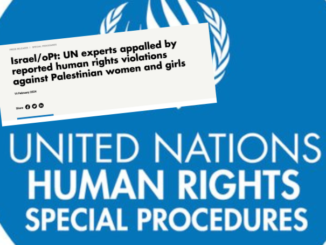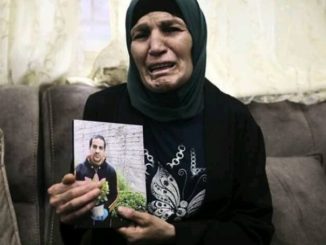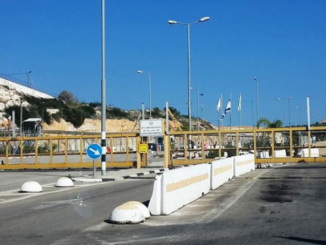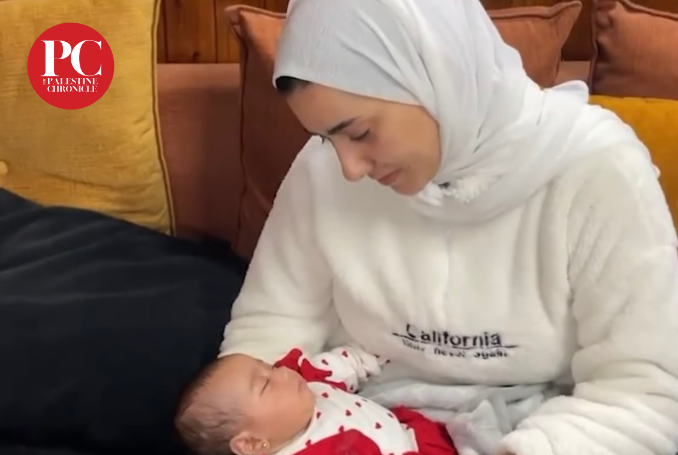
Kholoud was taken to a military vehicle. She wept and pleaded for them to leave her with her children. Her youngest daughter was just 40 days old.
Kholoud will not let go of her infant daughter. The recent horror she experienced is beyond description.
Being deprived of her four children was the harshest thing that 30-year-old Kholoud Al-Jarmi experienced during her detention in Israeli prisons.
Kholoud gave birth by C-section to her daughter a few weeks before her arrest. But her vulnerable state was of no concern to her Israeli captors, who arrested her husband as well, leaving their children with no parent to care for them.
Kholoud is one of dozens of Palestinian female prisoners who were released in the recent prisoner exchange between Israel and the Palestinian Resistance Movement, Hamas.
While she only spent two weeks in prison, she described what happened to her there as “a nightmare”.
Just Holding My Children
On November 18, Israeli soldiers stormed the Balata refugee camp, in the city of Nablus. On that day, Kholoud was visiting her mother’s house with her husband and children.
Suddenly, they heard the sounds of stun grenades around the house. Kholoud rushed to hold her children and comfort them. She told her husband that they should stay where they were until the Israeli army left the camp.
Shortly thereafter, Israeli soldiers stormed her mother’s home vandalizing everything in sight, while yelling and cursing at the family.
Kholoud held her children and closed her eyes in fear. “They were like monsters, destroying everything in front of them, and all I could hear was the sound of screaming and the breaking of glass and furniture,” she told the Palestine Chronicle.
“My children kept crying, I tried to calm them down, but I was as terrified as they were.”
The Israeli officer ordered Kholoud’s husband to produce his identity card. He was then arrested, handcuffed in front of his family, and taken away.
Israeli soldiers remained in the house for nearly an hour. Kholoud’s family was paralyzed with fear.
Sometime later, the same officer returned and asked Kholoud to produce her ID card. He reviewed it and then arrested her as well. Kholoud was completely shocked. Her children were inconsolable.
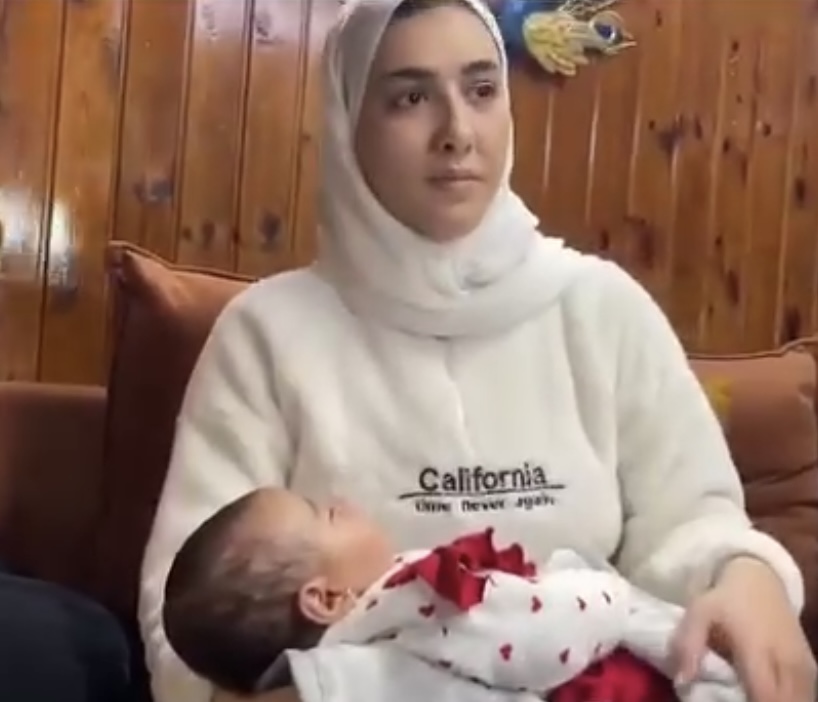
Fabrications
Kholoud was taken to a military vehicle. She wept and pleaded for them to leave her with her children. Her youngest daughter was just 40 days old.
“In the vehicle, soldiers started beating me. The wound from the C-section had not healed yet. When the soldiers were beating me, I felt a sharp burning in my belly,” she told the Palestine Chronicle.
The beating continued until they arrived at the Ariel settlement, approximately 15 kilometers from the city of Nablus. The soldiers strip searched Kholoud as she screamed.
It was in the Ariel settlement that the interrogation began. The crime she was charged with took her by complete surprise, “The investigators accused me of throwing a weapon from my mother’s house during the camp’s storming,” she said. “But I was with my children the whole time, they were terrified and I was holding them,” Kholoud told the Palestine Chronicle.
Kholoud endured severe torture during her interrogation. She was beaten with rifles; Israeli soldiers kicked her with their heavy boots, insulted her and spat on her.
Kholoud’s incision wound was giving her an incredible amount of pain. She asked the soldiers to call a doctor, but they would not listen.
“The pain was very strange, and it became clear that I had suffered uterine bleeding from the intensive beating, which was deliberately focused on my abdomen and back,” she told the Palestine Chronicle. “I almost fainted, many times, but my jailers did not care.”
Pain and Starvation
Throughout her detention, Kholoud suffered from severe fatigue and continuous bleeding.
She was transferred to Damon Prison after her interrogation. Israeli authorities extended her detention to file an indictment against her.
The Israeli judge changed the charge from throwing a weapon out of the window into raising a weapon at Israeli soldiers.
When she denied any wrongdoing, the judge and the Israeli military prosecutor threatened to sentence her for an extended period of time.
“In prison, the situation was horrible. The rooms were packed, and there weren’t enough beds, blankets, or even clothes. Some of the prisoners shared their clothes with us.”
The food was never enough for the prisoners. Every three prisoners were given one egg to share, along with small portions of undercooked rice.
For Kholoud, however, food was not a problem. Her only concern was for her children. She could not forget them crying at the door and trying to follow her as the Israeli soldiers were taking her away.
“How could I eat when my children were far away? I didn’t even sleep due to the anxiety and the pain,” she said.
On November 30, Israeli prison guards came and called her name without telling her that she would be released as part of the prisoner exchange.
She thought that she was being transferred again, so she sadly said goodbye to the other prisoners that had been so kind to her.
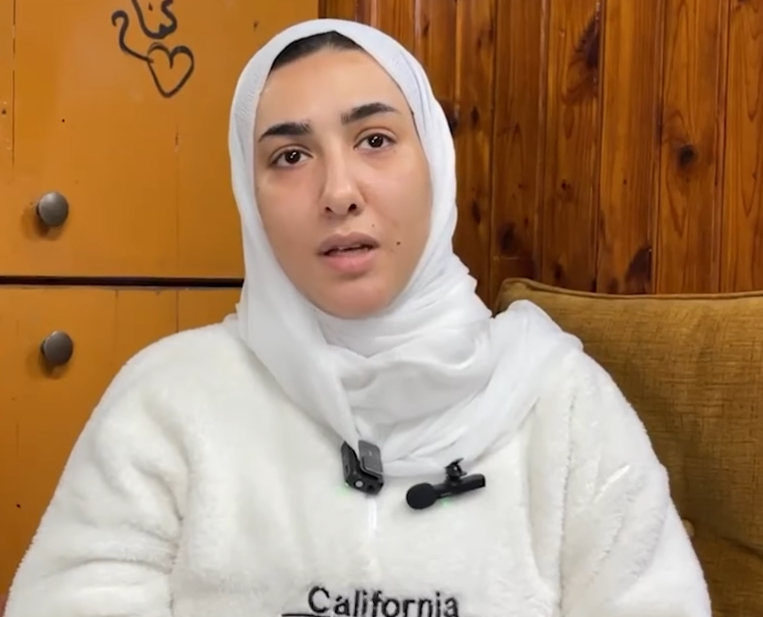
Israeli guards shoved her and tied her hands tightly, then dragged her to another room before taking her to the Red Cross bus. Only then did she realize that she was being released. She cried, again, but this time for joy and relief.
“They were very difficult days. I cannot believe I’m out of prison. I was subjected to systematic terror and they were trying to pin a charge on me that was completely fabricated. I only wanted to return to my children.”
When Kholoud returned home, she learned that her husband had also been released the day before.
She embraced her children and promised them that she would never be away from them again.
Her infant daughter cried whenever Kholoud carried her. For four days, she did not recognize her mother.
Upon her return home, Kholoud discovered that the soldiers had also stormed her house destroying everything inside.
Kholoud’s family is slowly working on recovering from the ordeal. “My children are still struggling from that traumatic event. They keep asking me why I left them. I’m trying to make up for those terrible days, and I don’t know when we will regain our stability and sense of safety,” she said.
‘No Pain like Mine’: The Story of Palestinian Prisoner Israa’ Ja’abis
(The Palestine Chronicle)
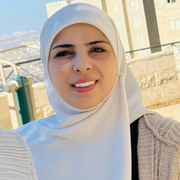
– Fayha’ Shalash is a Ramallah-based Palestinian journalist. She graduated from Birzeit University in 2008 and she has been working as a reporter and broadcaster ever since. Her articles appeared in several online publications. She contributed this article to The Palestine Chronicle.



